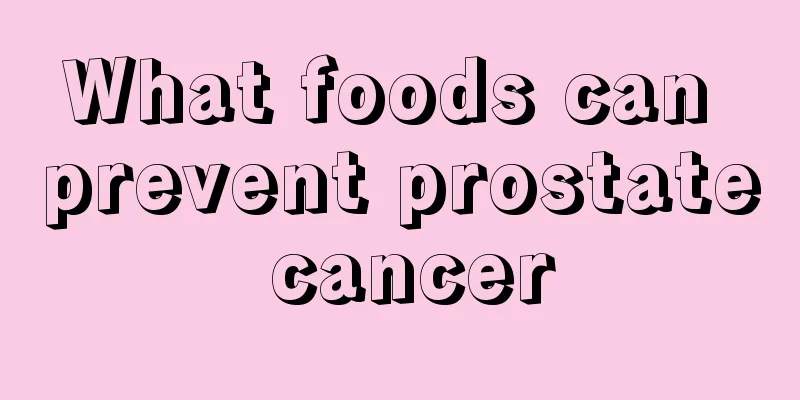What foods can prevent prostate cancer

|
Prostate cancer is the most common malignant tumor of the male reproductive system. We must be prepared for prevention through diet. What foods can prevent prostate cancer? Let me reveal it to you below. Foods to prevent prostate cancer1. Pomegranate juice It contains a large amount of polyphenolic flavanoids, which have antioxidant and anti-atherosclerotic effects. Epidemiological studies have shown that the intake of fruits and vegetables rich in phenolic compounds is associated with a lower cancer mortality rate. As a product rich in antioxidants, pomegranate juice has been studied in the laboratory for its potential to prevent prostate cancer. Because some tannins in the peel are extracted during industrial processing, commercial pomegranate juice is rich in flavanoids, so it is beneficial to consume pomegranate juice, especially pomegranate juice processed including the peel. 2. Tea Tea is the most widely consumed beverage in the world after water. Green tea, oolong tea and black tea are all made from the leaves of the tea plant, and their chemical composition and flavor vary greatly due to different processes. Green tea contains some polyphenolic compounds, including several polyphenols and epicatechin gallate (EGCG), which are safe to drink. A study of 49 patients with solid tumors found that drinking 3.5 to 4 cups of green tea three times a day was easily tolerated and could be safely consumed for at least 6 months. Epidemiological studies have found that men who regularly drink green tea have a lower incidence of prostate cancer. Other studies have found that Asian men who drink large doses of green tea have a lower incidence of prostate cancer than Western men. 3. Beans The function of beans and the preventive effect of phytoestrogens on prostate cancer have always been a hot topic of research. Most studies focus on two types of isoflavones, especially 5,7,45-trihydroxyisoflavone and isoflavone glycosides. Epidemiological studies have found that people with a diet rich in soy products have a low incidence of prostate cancer. It is reported that the incidence of prostate cancer in Chinese and Japanese men is lower than that in men born in the United States, and the incidence of prostate cancer in Asian immigrants in the United States is consistent with that in Americans. The intake of soy products in the diet may be the reason for the above differences, because the survey found that the average soy product content in the Asian diet is 10 times that of the standard American diet. The intake of isoflavones in Asians is 50 mg/d, while that in Americans is only 2 to 3 mg/d. In a survey of the dietary habits of 12,395 explorers in the United States, it was found that the incidence of prostate cancer in men who drank soy milk more than once a day was 70% lower than that of those who did not drink it. 4. Spinach Spinach has numerous health benefits, such as protecting eyesight, preventing prostate cancer, colon cancer and breast cancer; preventing heart disease, stroke and dementia; lowering blood pressure, resisting infection, and promoting bone health. Fresh spinach should be a regular on the table. 5. Carrots A diet rich in carotenoids has been linked to a lower risk of bladder, cervical, prostate, laryngeal and esophageal cancers. In addition to protecting against cancer, nutrients in carrots can boost immunity and promote ear, eye and gastrointestinal health. 6. Onion People who eat onions regularly have lower mortality rates from prostate cancer, esophageal cancer, and coronary heart disease. Onions also contain sulfides that can lower cholesterol and blood pressure, and amino acids that prevent bone loss. The natural antihistamine quercetin in onions reduces infection and relieves allergy symptoms. 7. Boron-rich foods Boron is an element widely found in fruits and nuts. Men who consume adequate amounts of boron in their diet can reduce the risk of prostate cancer. Researchers compared the eating habits of 76 men diagnosed with prostate cancer with those of 7,751 healthy men. The analysis found that the richer the boron content in food and beverages, the greater the reduction in the risk of prostate cancer. This protective effect of boron is not affected by other risk factors such as age, smoking, obesity and race. Foods rich in boron include peanuts, apricots, grapes, dried fruits, avocados, red wine and grape juice. 8. Tomato Prostate cancer is related to the oxidative damage of DNA (deoxyribonucleic acid) caused by free radicals. Men who eat a bowl of spaghetti made with tomato sauce every day for more than three weeks can greatly reduce the level of DNA damage and prostate-specific antigen (pSA) in the body. Researchers believe that tomatoes are rich in lycopene, which can offset the effects of free radicals. Lycopene has the strongest antioxidant properties among natural carotenoids. It has the functions of protecting genetic material DNA, inhibiting the proliferation of cancer cells and regulating hormone status. Its anti-prostate cancer effect has been confirmed by a large number of studies. In fact, some plant compounds in a large number of fruits and vegetables have anti-cancer effects. Among them, lycopene is an important carotenoid, which exists in the fruits and vegetables we eat daily. Tomatoes, apricots, guavas, watermelons, papayas and red grapes all contain more lycopene, especially tomatoes. An adult can meet the body's need for lycopene by eating 100 grams to 200 grams of tomatoes every day, and cooked tomatoes are more easily absorbed by the human body. 9. Eat a diet rich in vitamin D Vitamin D can prevent prostate cancer. Prostate epithelial cells contain vitamin D receptors. Normal vitamin D levels in the blood can inhibit the continued differentiation of established cancer cell groups. Therefore, vitamin D deficiency can lead to an increased risk of prostate cancer. As long as the intake of vitamin D in the diet is at or close to the recommended level, the risk of prostate cancer is normal. Numerous studies have shown that the risk of prostate cancer is not reduced when vitamin D intake exceeds the recommended level. Prostate cancer can not eat meat1. What kind of meat should not be eaten by prostate cancer patients? To reduce the intake of fat in the diet, you should eat low-fat foods, low-fat dairy products, add less oil to your food, and eat lean meats. Eat less spicy and greasy food, eat more vegetables and fruits high in lycopene, and maintain good living habits. 2. For prostate cancer, eat more beans and vegetables Westerners have never had the habit of eating soy products, but the soy products that Asians like to eat do contain the nemesis of prostate cancer. Isoflavones in soybeans can reduce the destructive effects of male hormones and inhibit and kill cancer cells. Westerners eat too few vegetables and should eat more vegetables like the Japanese and Chinese. In addition to Chinese cabbage, vegetables such as cauliflower and broccoli also have the effect of preventing and treating prostate cancer. In addition, you can also eat some flax seeds and tomatoes every day. Tomatoes contain lycopene, which has a preventive and therapeutic effect on prostate cancer. 3. People with prostate cancer should not drink green tea Green tea contains a variety of antioxidants, the main active ingredients are tea polyphenols and catechin compounds. Antioxidant ingredients have a significant inhibitory effect on the malignant transformation of cells induced by a variety of carcinogens, including aflatoxin, benzopyrene, cigarette carcinogens, amino acid cleavage products, etc., and help stabilize cell structure and reduce cell damage, while changes in cell structure and cell damage can cause cell cancer. 4. People with prostate cancer should not eat beans Beans contain phytoestrogens, which are similar to female estrogen. The isoflavones contained in soybeans can reduce the destructive effects of male hormones and inhibit and kill cancer cells. 5. Prostate cancer patients should not eat foods rich in selenium Selenium is an important antioxidant that can reduce the incidence of prostate cancer by 70%, so it can be taken in moderation. Selenium in the diet is mainly found in animal liver, seafood, milk and dairy products, mushrooms, garlic and asparagus. High-risk populationObese man Obese men have twice the risk of prostate cancer compared with normal-weight men, a new study finds. Researchers say any effort to lose weight is likely to reduce the risk of prostate cancer, which is rising steadily among men in developed countries. Man sitting too high A study reported that after studying the human anatomy of 28 prostate cancer patients, it was found that these patients sat higher on chairs than healthy people of the same height. Further research showed that those with high levels of the sex hormone testosterone increased their "sitting height" faster during development than those with normal testosterone levels. High testosterone concentrations can induce subtle changes in prostate cells, stimulating the growth of cancer cells, leading to the occurrence of prostate cancer in adulthood. Bald man Bald men are twice as likely to develop prostate cancer as non-bald men. Studies have found that hair loss may be caused by testosterone levels during puberty, and the risk of prostate cancer in men may be related to testosterone levels in the body, which may appear as early as puberty. In addition, hormones are also related to baldness, which may explain the relationship between baldness and prostate cancer. |
<<: What is the diagnostic process for prostate cancer
>>: What symptoms should we pay attention to for prostate cancer and how to prevent prostate cancer
Recommend
What are the early symptoms of lymphoma and how to treat it
What are the early symptoms of lymphoma? How to t...
How to defrost the refrigerator?
At home, people often put leftovers in the refrig...
A collection of seven tests for lymphoma
Hello everyone, today we are going to tell you so...
Can surgery be performed after gastric cancer lymph node metastasis? There is a high chance of cure
Surgery can be performed after gastric cancer lym...
What are the nursing rounds for pancreatic cancer
Having a serious illness is very tormenting, both...
What are some foods that are good for the stomach?
Nowadays, many white-collar workers do not pay at...
Can I have massage for a three month old baby?
In daily life, many people have the habit of mass...
What are the effects and functions of eucalyptus essential oil?
Eucalyptus essential oil is a common way of healt...
How many days does neonatal jaundice appear
Neonatal jaundice is a relatively common disease,...
Homemade contact lens solution
Now many people have found that wearing glasses a...
What should I do if my hands are burned and blistered
There are many things in our lives that we need t...
Can I drink water on an empty stomach before a physical examination in the morning?
Nowadays, people's thinking has become more p...
The impact of hypothyroidism on the heart
The full name of hypothyroidism is hypothyroidism...
Four ways to prevent uterine tumors
The occurrence of uterine tumors is closely relat...
Can I still get orthodontics at the age of 27
Some people want to improve their teeth through o...









